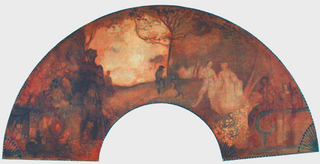
Sir Edward William Elgar, 1st Baronet, was an English composer, many of whose works have entered the British and international classical concert repertoire. Among his best-known compositions are orchestral works including the Enigma Variations, the Pomp and Circumstance Marches, concertos for violin and cello, and two symphonies. He also composed choral works, including The Dream of Gerontius, chamber music and songs. He was appointed Master of the King's Musick in 1924.

Edward Elgar composed his Variations on an Original Theme, Op. 36, popularly known as the Enigma Variations, between October 1898 and February 1899. It is an orchestral work comprising fourteen variations on an original theme.

The Sanguine Fan, Op. 81, is a single-act ballet written by Edward Elgar in 1917. It was composed to raise money for wartime charities, and after two performances in 1917 and a recording of excerpts in 1920, the score was neglected until 1973, when the conductor Sir Adrian Boult revived it for a recording. It was later staged in the theatre by the London Festival Ballet.

In the South (Alassio), Op. 50, is a concert overture composed by Edward Elgar during a family holiday in Italy in the winter of 1903 to 1904. He was working on a symphony, but the local atmosphere inspired him instead to write what some have seen as a tone poem, with an Italian flavour. At about 20 minutes' duration it was the composer's longest sustained orchestral piece to that time.

The Wand of Youth Suites No. 1 and No. 2 are works for orchestra by Edward Elgar, first performed in 1907 and 1908 respectively. The titles Elgar gave them were, in full: The Wand of Youth First Suite, Op. 1a (1869–1907) and The Wand of Youth Second Suite,. The music was drawn from material written by the composer in his youth and orchestrated forty years or so later.

Three Bavarian Dances, Op. 27, is an orchestral work by Edward Elgar.
The Serenade for String Orchestra in E minor, Op. 20, is an early piece in three short movements, by Edward Elgar. It was written in March 1892 and first performed privately in that year; its public premiere was in 1896. It became one of Elgar's most popular compositions, and has been recorded many times.
"Pleading" is a poem written by Arthur L. Salmon, and set to music by the English composer Edward Elgar in 1908, as his Op.48.
The River is a song written by the English composer Edward Elgar in 1909 as his Op.60, No.2.
”Queen Mary's Song” is a song written by the English composer Edward Elgar in 1889. The words are by Tennyson, sung by Mary as she plays a lute in Scene II, Act V of his play "Queen Mary: A Drama."

"A War Song", originally called "A Soldier's Song", was a poem written by C. Flavell Hayward and set to music by the English composer Edward Elgar in 1884.
"Follow the Colours" is a marching song written by the English composer Edward Elgar in 1907, with words by Capt. William de Courcy Stretton. The song is for male voice solo with an optional male voice chorus, accompanied by piano, orchestra or military band.

"In Moonlight" is a song with music written by the English composer Edward Elgar in 1904 to words from the poem "An Ariette for Music. To a Lady singing to her Accompaniment on the Guitar", by Percy Bysshe Shelley (1792-1822) and published in 1832.

Salut d'Amour (Liebesgruß), Op. 12, is a musical work composed by Edward Elgar in 1888, originally written for violin and piano.
Chanson de Nuit, Op. 15, No. 1, is a musical work composed by Edward Elgar for violin and piano, and later orchestrated by the composer. Its first publication was in 1897, though it is considered that it was almost certainly written in 1889 or 1890.

Chanson de Matin, Op. 15, No. 2, is a musical work composed by Edward Elgar for violin and piano, and later orchestrated by the composer. Its first publication was in 1899, though it is thought that it was almost certainly written in 1889 or 1890.

Caroline Alice, Lady Elgar was an English author of verse and prose fiction, who married the composer Edward Elgar.
Sevillana, or, as the composer titled it Sevillaña , is a short piece for orchestra by the English composer Edward Elgar written in 1884 and published as his Op. 7. It was first published by Tuckwood, with the composer's revision of 1889 published by Ascherberg in 1895. It was dedicated to W. C. Stockley, conductor of the Birmingham Festival.
The Powick Asylum Music consists of a number of sets of dance music – quadrilles and polkas – written by Edward Elgar during his time as bandmaster at the Worcester City and County Lunatic Asylum between 1879 and 1884. The music was not published, but the original manuscripts of instrumental parts are preserved in the collection of the Elgar Birthplace Museum.










